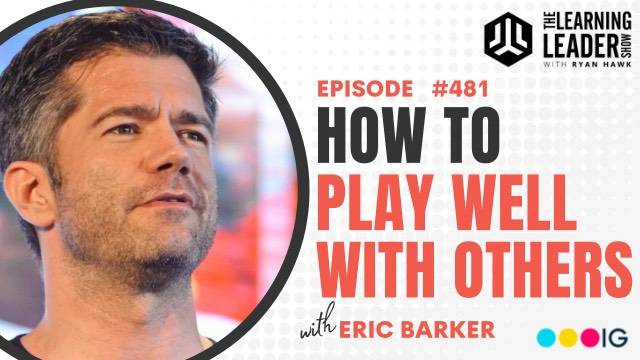Eric Barker is the author of The Wall Street Journal bestseller “Barking Up the Wrong Tree,” which has sold over half a million copies and been translated into 19 languages. It was even the subject of a question on “Jeopardy!” He is a sought-after thinker and has given talks at MIT, Yale, Google, and the Olympic Training Center. His new book is called “Plays Well with Others, The Surprising Science Behind Why Everything You Know About Relationships Is (Mostly) Wrong.
WATCH this conversation on YouTube. And SUBSCRIBE!
Read my new book, The Pursuit Of Excellence — See why Patrick Lencioni said “this book is an absolute must-read if you care to live an excellent life.”
FORBES recently called WELCOME TO MANAGEMENT, “the best leadership book of 2020.”
Be part of “Mindful Monday” — Text Hawk to 66866
Subscribe on iTunes or Stitcher Radio
The Learning Leader Show
- Love – Casanova said, “love is three-quarters curiosity.” That curiosity creates deep knowledge… And that helps you build what researcher John Gottman calls, a “love map.”
- “Everyone asks how you got together; nobody asks how you stayed together. And the latter is often the real achievement to be proud of.”
- Your WHO: Take your health, for example. The Framingham study showed that drinking, smoking, and obesity are all quite contagious. If someone you consider a friend becomes obese, your likelihood of obesity increases by 53%. And if the friendship is mutual, the number rises to 171%.
- Optimism – Shawn Achor’s Ted Talk (so funny and fast). MET Life saw such great results among happy salespeople that they tried an experiment: they started hiring people based on optimism. It turns out that the optimistic group outsold their more pessimistic counterparts by 19% in year one and 57% in year two.
- Profiling – “Humans are prone to seeing meaning when there is none.” There’s a fundamental reason that astrologers outnumber astronomers. Emotionally we want a feeling of control over the world around us. We desperately need the world to at least seem to make sense. And for that, we need a story, even if it isn’t true.
- Lying — how can you spot a liar? The average college student lies in about a third of conversations. For adults, it’s 1 in 5. In online dating, 81% of profiles deviate from the truth. And we are terrible at detecting lies, averaging a 54% success rate.
- So how do we become better at understanding if someone is lying? This system takes patience (so it isn’t useful for little lies but can be powerful for bigger issues). “The science overwhelming recommended a nuanced and sophisticated method humans have never tried in the past 5,000 years when attempting to detect lies: being nice. Never be a bad cop, be a friendly journalist. You have to get them to like you. To open up. To talk a lot. And to make a mistake that reveals deception. Don’t accuse. Be curious.
- “Writing a book is like telling a joke and having to wait two years to know whether or not it was funny.” —ALAIN DE BOTTON
- Apply to be part of my Leadership Circle
- Read: The Pursuit Of Excellence
- Read: WELCOME TO MANAGEMENT
- Be part of “Mindful Monday” — Text HAWK to 66866
- Read: Plays Well With Others
- Connect with me on LinkedIn
- Join our Facebook Group: The Learning Leader Community
- To Follow Me on Twitter: @RyanHawk12
More Learning:
Episode 078: Kat Cole – From Hooters Waitress To President of Cinnabon
Episode 216: Jim Collins — How To Go From Good To Great
Episode #300: AJ & Keith Hawk – How To Instill Work Ethic & Curiosity In Your Children
Episode #303: General Stanley McChrystal – The New Definition Of Leadership


Leave A Comment